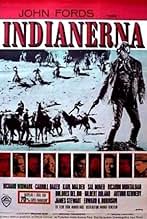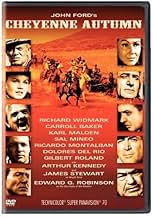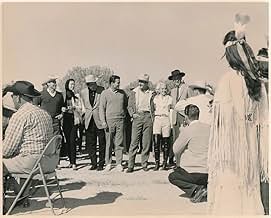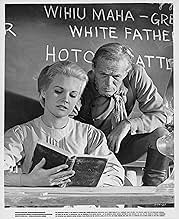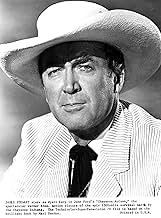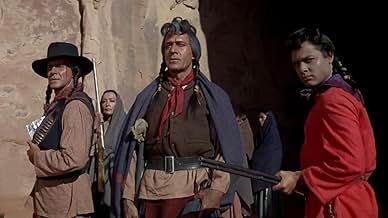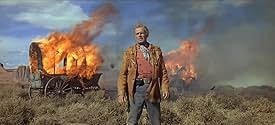Der gebrochenen Versprechen der US-Regierung überdrüssig, macht sich der Stamm der Cheyenne-Indianer auf den Weg zum Land seiner Ahnen. Allerdings wird ein mitfühlender Kavallerieoffizier da... Alles lesenDer gebrochenen Versprechen der US-Regierung überdrüssig, macht sich der Stamm der Cheyenne-Indianer auf den Weg zum Land seiner Ahnen. Allerdings wird ein mitfühlender Kavallerieoffizier damit beauftragt, sie zu ihrem Reservat zurückzubringen.Der gebrochenen Versprechen der US-Regierung überdrüssig, macht sich der Stamm der Cheyenne-Indianer auf den Weg zum Land seiner Ahnen. Allerdings wird ein mitfühlender Kavallerieoffizier damit beauftragt, sie zu ihrem Reservat zurückzubringen.
- Regie
- Drehbuch
- Hauptbesetzung
- Für 1 Oscar nominiert
- 1 Gewinn & 3 Nominierungen insgesamt
- Spanish Woman
- (as Dolores Del Rio)
- Guinevere Plantagenet
- (as Betty Ellen)
Empfohlene Bewertungen
Compared with other western movies, the main difference and innovation is that here any killed man is a REAL tragedy, that exhaustion, famine, cold, violence are REAL sufferings for the miserable people on the screen (not just for the Cheyennes, even for the whites). And all that is shown us by Ford ruthlessly, uncompromisingly. The fact that the director stands for the Indians is not as much innovative as it seems. All along his career Ford showed respect and sympathy for them. In the finale, just after an apparent happy ending, we have again violence, again a murder, again a distressed mother: we almost feel the same grief of hers. It is somewhat ironic that in the same year the film was made, 1964, the fashion of Italian western movies invaded the world of cinema, with furious, acrobatic gun-fights and hundreds of shot-dead people, like in a sort of funny game.
The movie is split into two parts by a comic interlude, the episode placed in Dodge City, which is actually a farce. I think that Ford wanted to pay a homage and bid his personal farewell to the old silent western-movies of the 1920s, when his career started. The funny situations are deliberately over the top: see the sensational, licentious joke, when Wyatt Earp (Jimmy Stewart) realizes that he actually had met the girl in Wichita... In any case, a somewhat gloomy mood permeates even this comic part. The main characters are all aged, grey-haired and seemingly life-weary. And the episode is introduced by a particularly brutal, cruel murder.
I think that "Cheyenne Autumn" is a beautiful film, with a good story, great visual beauties, and, in particular, an excellent acting by the whole cast. But it is tough for me to face John Ford's desperate vision. After all, what I most like in the movie is to see, once again, Ben Johnson and Harry Carey Jr on horse-back, in their blue uniforms (by the way: why are they uncredited?). They are both aged and bulkier compared with their look in the great Ford's western-epics of their youth. Never mind: they are almost dearer to me for this very reason...
This makes more sense, because most Ford Westerns, with perhaps the exception of "Stagecoach" and "Rio Grande" dealt relatively fairly with Indian characters. I don't think he had much to apologize for.
This movie is underrated by critics. I'm not sure why. I thought it compared favorably with his better work.
Here are the positives about the movie:
- It may be Ford's most beautiful film. He lingers in Monument Valley far longer than the logic of the script would dictate. He knew this would be that last time he would shoot there. The results are spectacular.
- The film has a stately, almost regal pace with an excellent accompanying soundtrack. This matches the pace of the central plot element – a six month journey by foot.
- It manages to never be dull. This is quite an accomplishment since there is no real hero, no real heavy and very little violent conflict. It's an example of very fine low key storytelling.
- Although this is a strong Indian point of view movie, it never becomes condescending or maudlin. Both sides are presented with respect and complexity.
- I've read much criticism of the Dodge City comic relief interlude. I thought this was fantastic segment. What a pleasure to see old pros like John Carradine, James Stewart and Arthur Kennedy do cameos in Ford's last Western. Ford understood the importance of inserting comic relief into Westerns, which are normally tense dramas in need of counterpoint. This is even more effective in the fundamentally somber "Cheyenne Autumn".
- Almost all strong Indian point of view movies are relentless downers that include no comic relief. For example, "Devil's Doorway", "Broken Arrow", "Dances With Wolves". Ford doesn't compromise on his traditional heavy use of humor in this movie and he also includes a somewhat optimistic ending. The ending may seem unrealistically positive, but it is actually at least partly rooted in historical accuracy, from what I've read. Of course, in the big historical picture there was no happy ending for the Indians. The question is: who wants to watch a movie that is that depressing? Ford strikes a good compromise here.
- Carol Baker is an underrated actress. She has a great screen presence and is very good in this film. Her character was very credible, if maybe a little too good looking. If she's a typical 1880's Quaker chick, I would have had to rethink my religious affiliation.
Now here are some things that kept the movie from being better:
- Widmark looks great, but I wish his character had been a more active player in plot developments. It's not best for the male lead to be too much of an observer. Also, he is way too old to be Carol Baker's romantic interest.
- The Indians are poorly cast with the use of mediocre Hispanic actors. I can't believe those weird bangs are authentic hairdos either. If they are, I would have invoked artistic license to change them.
- The subplot with the split between the Cheyenne leaders and the final confrontation at the end was poorly drawn, poorly acted and pointless.
- There are a few plot holes. The only one that really bothered me was the Cheyenne somehow managing to smuggle 20 rifles into their holding facility in the fort in Nebraska.
- Finally, this isn't really a fault, but I wanted to mention that I'm torn about Karl Malden's character.
On the one hand, it seems very odd to introduce a German officer who's oppressing the Cheyenne because "he's only following orders." Do we have to implicate the Germans in our genocide? Don't they have enough problems of their own on this issue?
On the other hand, I guess the point was to draw a comparison between the Holocaust and the destruction of the American Indian population. This was probably a very aggressive and controversial idea in 1964, for Americans anyway. The Germans I've known over the years never had a problem mentioning it to me. In fact, often they would talk of little else.
Some people believe that Westerns are not more of use in Hollywood. I believe that some westerns giving real stories of what happened with the Indians are very much necessary to understand the history of the real American people. Geronimo, Sitting Bull, Dull Knife and others were not criminals, they were only defending the land where they were born and raised. So their lives should be brought fairly to the screen in the coming future.
This sprawling epic film displays Western action , shootouts , drama and spectacular battles . It's a thoughtful piece for its time that had an original tragic ending and imbued with moments of sensitive poetry . This nice Western contains interesting characters , full of wide open space and dramatic moments . This classic , sturdy picture ranks as one of the most sentimental of John Ford's work . Thought-provoking , enjoyable screenplay portraying in depth characters and brooding events with interesting issues running beneath script surface and suggested by Mari Sandoz in "Cheyenne Autumn¨ with screenplay by James R. Webb and based on a novel titled Last Frontier by Howard Fast who also wrote Spartacus . This excellent film featuring a magnificent performance by the whole main cast , including a top-notch supporting cast . Awesome Richard Widmark in a larger-than-life character along with a gorgeous Carrol Baker and a magnificent Karl Malden as deranged captain Wessels . In the film appears , as usual , Ford's favourite actors such as : Ben Johnson , Harry Carey Jr. , Mike Mazurki , George O'Brien , Mae Marsh , Patrick Wayne , Dolores Del Rio , Ken Curtis , Elizabeh Allen , Willis Bouchey , and , of course , James Stewart as obstinate sheriff Earp . Ford added the segment with Stewart in place of an intermission , in spite of the film was overlong , and so he came up with the Wyatt Earp segment , giving Stewart an awesome interpretation , as usual . Outdoors are pretty gorgeous and well photographed in Super Panavision 70mm by William H. Clothier , Ford's regular , and filmed on location in Moab, Utah ,Fort Laramie, Wyoming, Monument Valley, Utah , Gunnison Canyon , Colorado . Rousing and an impressive musical score by Alex North who composed other masterpieces as Spartacus and Cleopatra.
This may not be Ford's best Western , as many would claim , but it's still head ad shoulders above most big-scale movies . You'll find the ending over-dramatic according to your tastes , though it's lovingly composed by John Ford who really picks up battle , drama and sensibility towards the ending . Rating : Better than average , worthwhile watching . The motion picture well produced by Bernard Smith was brilliantly directed by John Ford at his last film . This powerful movie will appeal to Indian Western fans .
My own take on that is the otherwise surprising absence of John Ford's customary over-reliance on sentimentality in this particular enterprise. At the very least when he made a movie with a setting in the Old West, he usually insisted upon using folk songs, sometimes ad nauseum, as background (and foreground) musical accompaniment, but here the very sophisticated Alex North is credited with the musical score, and its bitter strains are not at all typical of a John Ford production. I do not know if Mr. North was assigned to this project against Mr. Ford's preference, but that noted composer's contribution (He was nominated fourteen times for an Academy Award, though not for this one.) is one of his best and most appropriate accomplishments, to my ears. Except for his uncredited work on "Young Cassidy" and the truly atypical "Seven Women" starring Anne Bancroft which followed this major screen opus, John Ford made a final bow here that may not be his best but which unquestionably bears the mark of a master of the cinema.
Wusstest du schon
- PatzerThe language used by the Cheyenne in this movie is not Cheyenne. It is Navajo. Cheyenne is an Algonquian language, whereas Navajo is Athabaskan (Na Dene), and they do not sound even remotely similar. This is explainable, however, by the fact that this film was shot on the Navajo Nation.
- Zitate
Secretary of the Interior: Oh, Henry... you and I fought together at Gettysburg. You had never seen a Negro slave. All you ever knew was that they were human beings with the rights of human beings - and it was worth an arm to you.
- Alternative VersionenMany television prints run 145 minutes, and omit the scene with James Stewart as Wyatt Earp. The video release is the full 154-minute version.
- VerbindungenEdited into Film socialisme (2010)
Top-Auswahl
- How long is Cheyenne Autumn?Powered by Alexa
Details
Box Office
- Budget
- 4.200.000 $ (geschätzt)
- Weltweiter Bruttoertrag
- 10.980 $
- Laufzeit2 Stunden 34 Minuten
- Seitenverhältnis
- 2.20 : 1



